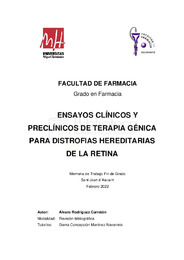Please use this identifier to cite or link to this item:
https://hdl.handle.net/11000/28987Full metadata record
| DC Field | Value | Language |
|---|---|---|
| dc.contributor.advisor | Martinez Navarrete, Gema | - |
| dc.contributor.author | Rodríguez Carretón, Álvaro | - |
| dc.contributor.other | Departamentos de la UMH::Histología y Anatomía | es_ES |
| dc.date.accessioned | 2023-03-20T08:11:54Z | - |
| dc.date.available | 2023-03-20T08:11:54Z | - |
| dc.date.created | 2022-01-26 | - |
| dc.identifier.uri | https://hdl.handle.net/11000/28987 | - |
| dc.description.abstract | Las distrofias hereditarias de la retina son enfermedades genéticas que provocan un gran impedimento visual, en condiciones normales afectan a los dos ojos, y tienen un carácter crónico e incapacitante, progresando con los años. En los últimos años, se han logrado grandes avances en su tratamiento mediante el uso de la terapia génica. La terapia génica para corregir defectos genéticos puede estar mediada tanto por vectores virales como no virales, y ha mostrado gran un potencial en el tratamiento las distrofias hereditarias de la retina, obteniendo unos mejores resultados que el tratamiento basado únicamente en agentes farmacológicos. Aun siendo una modalidad terapéutica actualmente limitada por factores como el número de genes a tratar o su método invasivo, los resultados obtenidos con esta modalidad terapéutica son una garantía de su potencial. El objetivo de esta revisión es el de poner de manifiesto el uso de la terapia génica enfocada al tratamiento de las distrofias hereditarias de la retina en la fase de ensayo clínico, así como los resultados, seguridad y potencial demostrados por dichos ensayos | es_ES |
| dc.description.abstract | Hereditary retinal dystrophies are genetic diseases that cause great visual impairment, under normal conditions improved in both eyes, and have a chronic and disabling character, progressing over the years. In recent years, great strides have been made in its treatment by gene therapy. Gene therapy to correct genetic defects can be mediated by both viral and non-viral vectors,and has shown great potential in the treatment of hereditary retinal dystrophies, obtaining better results than treatment based solely on pharmacological agents. Even though it is a therapeutic modality currently limited by factors such as the number of genes to be treated or its invasive method, the results obtained with this therapeutic modality are a guarantee of its potential. The objective of this review is to show the use of gene therapy focused on the treatment of hereditary retinal dystrophies in the clinical trial phase, as well as the results, safety and potential demonstrated by said trials. | es_ES |
| dc.format | application/pdf | es_ES |
| dc.format.extent | 44 | es_ES |
| dc.language.iso | spa | es_ES |
| dc.publisher | Universidad Miguel Hernández de Elche | es_ES |
| dc.rights | info:eu-repo/semantics/openAccess | es_ES |
| dc.rights.uri | http://creativecommons.org/licenses/by-nc-nd/4.0/ | * |
| dc.subject | distrofias hereditarias de la retina | es_ES |
| dc.subject | terapia génica | es_ES |
| dc.subject | vectores virales/no virales | es_ES |
| dc.subject | ensayos clínicos | es_ES |
| dc.subject | ensayos preclínicos | es_ES |
| dc.subject.other | CDU::6 - Ciencias aplicadas | es_ES |
| dc.title | Ensayos clínicos y preclínicos de terapia génica para distrofias hereditarias de la retina | es_ES |
| dc.type | info:eu-repo/semantics/bachelorThesis | es_ES |

View/Open:
ALVARO RODRIGUEZ CARRETON definitivo 2.pdf
1,24 MB
Adobe PDF
Share:
.png)
